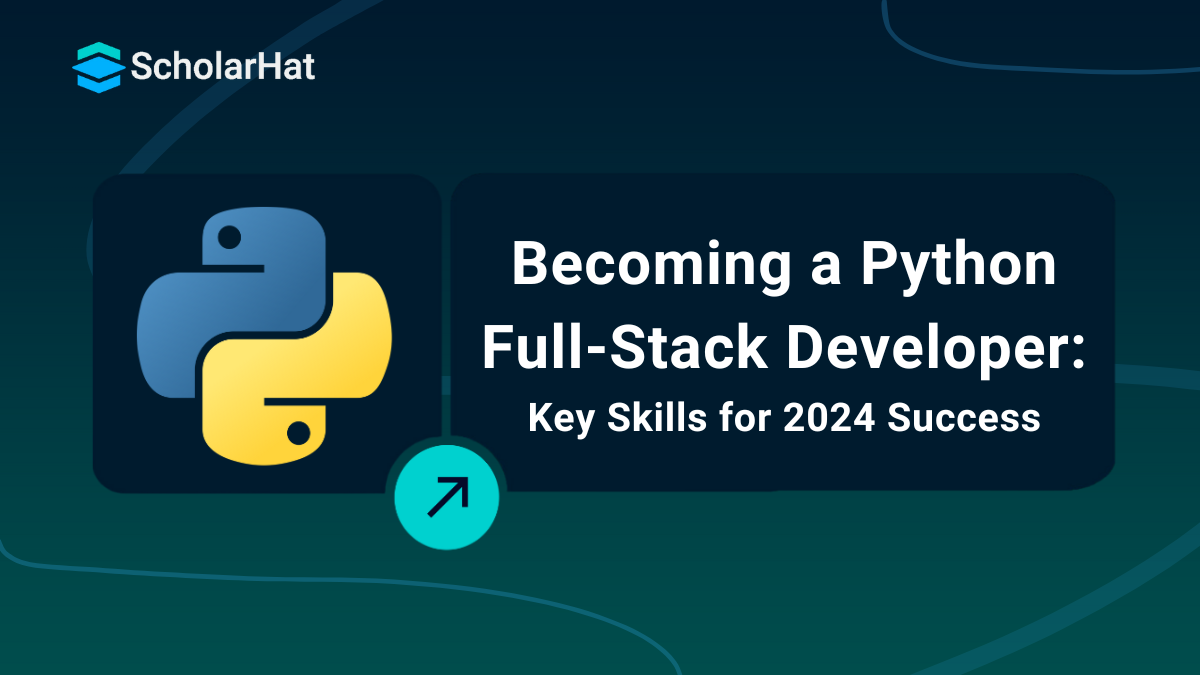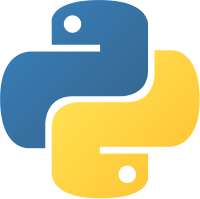18
AprEssential Python Full-Stack Developer Skills You Need to Master in 2025
Python Full-Stack Developer Skills
Python Full-Stack Developer Skills include a wide set of skills that are essential for anyone wishing to manage both the front-end and back-end of web applications. If you want to work in this sector, you'll need to know Python, but that's only the beginning. You'll also need to become familiar with web frameworks such as Django or Flask, which can help you manage server-side code more efficiently. HTML, CSS, and JavaScript abilities are required on the front end to create an interactive and user-friendly interface. It's about combining all of these abilities to create seamless, dynamic websites and applications that are both sturdy and scalable.
In this Python tutorial, we will focus on teaching you the basic Skills Required for a Python Full Stack Developer. Firstly, let’s discuss Who is a Python full-stack developer.
Who is a Python full-stack developer?
- A web developer who manages to deal with all significant aspects of developing a web application using Python is called a Python full-stack developer.
- Actually, the front end, or UI, is the one faced by the users and capable of displaying and working with various data, while the back end, or the server-side script, is also written in Python.
- Currently, despite operating with programming languages such as HTML, CSS, and JavaScript, front-end developers are turning to PyScript, the Python front-end development framework.
- Flask, a very popular back-end framework, and Django are also available.
- These developers are precious for keeping all the essential staples of the website, as well as for active and correct client-server correspondence.
Skills Required For Python Full Stack Developer
Python full-stack developer's job is not an easy thing to do but ya if you have some sort of Python Full-Stack Developer Skills then you will get the win-win position. So let's go with an overview of some Python Full-Stack Developer Skills to make it easier to understand.
Here are the essential Skills Required For a Python Full Stack Developer:
- Expertise in Python: Proficiency is needed in creating backend applications; also, knowledge of Python and such frameworks as Django and Flask is essential.
- Front-End Technologies: Familiarity with the HTML, CSS, and JavaScript languages and frameworks such as React or AngularJS for creating complex, interactive UIs.
- Database Management: Familiarity with relational databases (SQL: PostgreSQL, MySQL, etc.) and NoSQL databases (Non-SQL: MongoDB, etc.) for storing and manipulating data.
- Version Control Systems: Git is the source hub for the version and collaborative management of computer code.
- API Development and Integration: The skills to create and manipulate RESTful APIs plus knowledge of how to use them in applications.
- Deployment and Cloud Services: Familiarity with application deployment tools and platforms, such as Docker, AWS, and Heroku.
- Understanding of MVC Architecture: Familiarity with the model for efficient organization and interaction of applications that work through the Internet – Model-View-Controller (MVC).
- Problem-Solving and Debugging: Presents solid problem-solving skills apart from good debugging skills on front and back-end problems.
- Soft Skills: These are skills in the decision-making process, cooperation with other programmers/IT specialists, and tracking/organizing projects.
Yes, It's just a trailer a true movie starts here see below we have listed some Python Full-Stack Developer Skills along with different categories.
- Core Python Skills
- Front-End Development Skills
- Back-End Development Skills
- Additional Technical Skills for Python Full-Stack Developers
- Soft Skills Required for Python Full Stack Developers
1. Core Python Skills
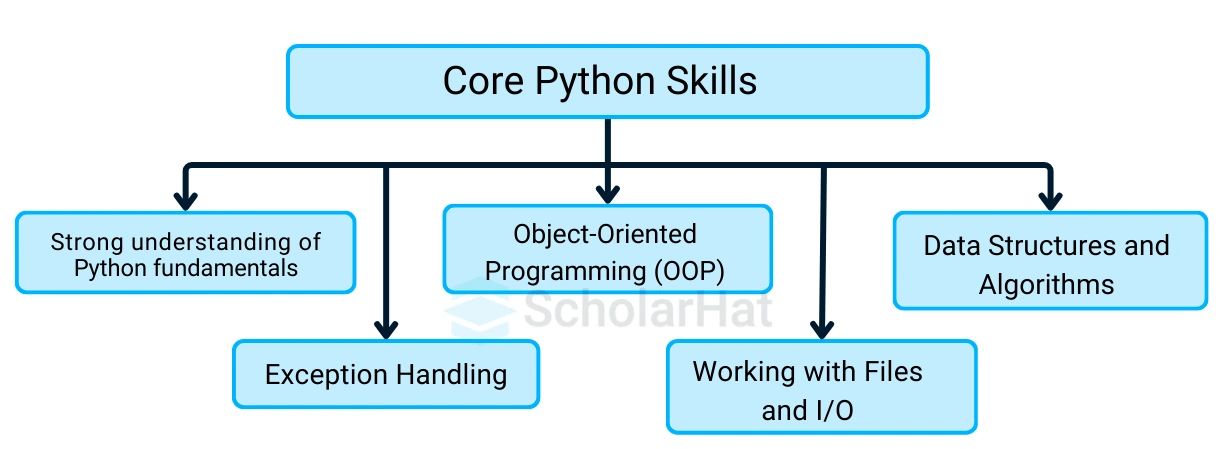
Here are the fundamental Python abilities that you should focus on.
- Fundamental Syntax and Data Structures: Students will learn about Python's syntactic structure and syntax of variables, basic Python data types (lists, tuples, dictionaries, sets), the syntax of loops, and conditional statements.
- Functions and Modules: Knowledge about functions, definitions, scopes, closures, usage of and with modules and packages.
- Object-Oriented Programming (OOP): Understanding of classes and objects, how they relate to each other in OOP hierarchy, polymorphism, encapsulation principles, and OOP concepts as a whole.
- Error Handling and Exceptions: The errors and how best to deal with them by implementing try-except blocks are crucial to writing excellent code.
- File Handling: File Handling involves controlling the opening, closing, reading, and writing of files and performing operations on different types of files.
- Libraries and Frameworks: Familiarity with groups majoring in Python, such as NumPy and Pandas, and requests for starkly different objectives.
- Virtual Environments and Package Management: To manage dependencies and project packages, you should use Virtual Environments (venv or virtual) and Package Managers (pip).
- Understanding of Iterators and Generators: By being familiar with iterators and generators, you can operate with sequences and construct proper pipelines for data transformation.
- Testing and Debugging: Technical competencies include knowledge of how to write and run tests using unit tests or pytest and successful debugging.
- Basic Algorithms and Data Structures: Popular algorithms and data structures, such as sorting algorithms and data structures, linked lists, and trees, are commonly used in problem-solving.
2. Front-End Development Skills
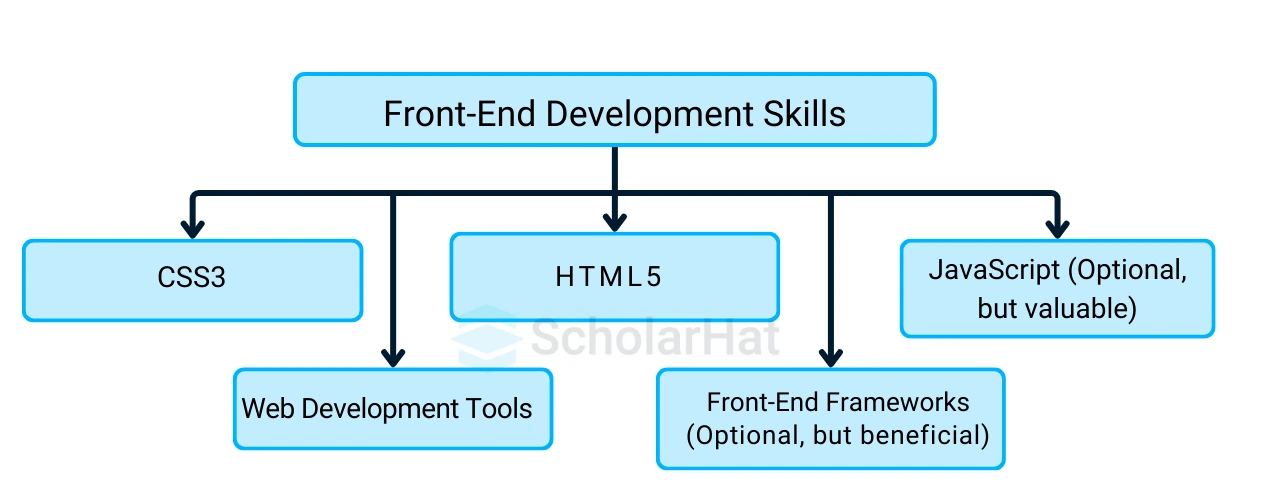
As a Python full-stack developer, you must have a strong understanding of front-end programming in order to provide a smooth user experience.
Here's what you need to excel at front-end development:
HTML/CSS Mastery
- You should be able to create well-structured, responsive web pages using HTML and CSS.
- This includes understanding layout approaches, stylistic ideas, and how to ensure that your designs look good on all devices.
JavaScript Proficiency
- JavaScript proficiency is required to bring interaction to your online apps.
- Experience with current frameworks such as React, Angular, and Vue.JavaScript may significantly improve your capacity to create dynamic and interesting user interfaces.
Version Control
- Understanding how to use version control systems such as Git is essential for effective collaboration with other developers and codebase management.
- It helps to keep track of changes and streamlines the development process.
Mastering these skills will ensure that your front-end development work is both effective and visually beautiful, matching your back-end Python knowledge properly.
3. Back-End Development Skills
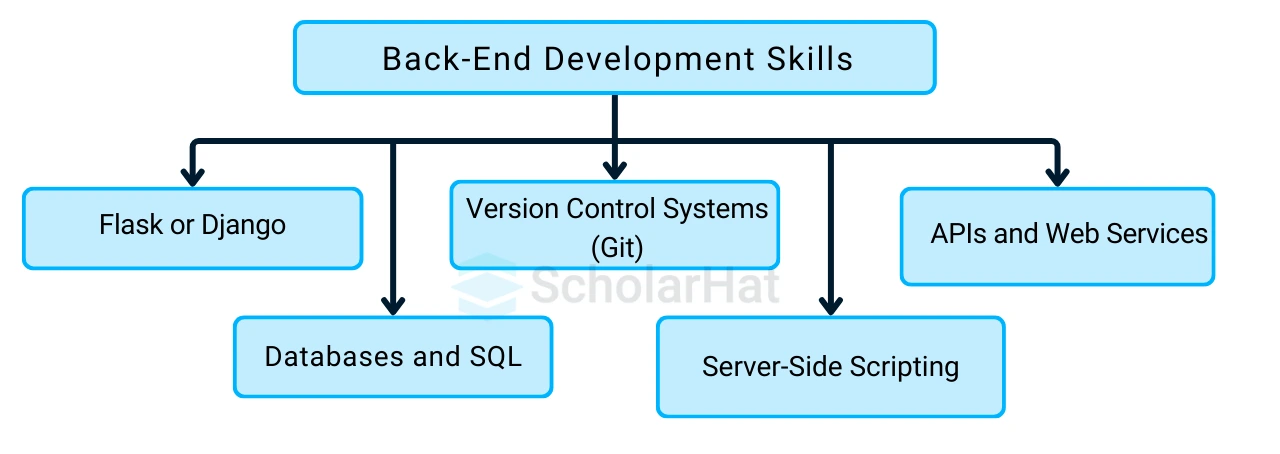
Knowledge about back-end programming in a full-stack developer is important in the development of complex systems.
Here’s what should be the focus in backend development:
- Python Proficiency: The server-side implementation database preservation and API authorization need to be done using Python with the help of Django and Flask.
- Database Management: Familiarity with structured databases (PostgreSQL, MySQL, etc.) and NoSQL databases (MongoDB, etc.) is crucial for data storage and retrieval.
- API Development: Understanding how to create, develop, and deploy RESTful or GraphQL APIs allows an application to communicate with front-end components or other services.
With such skills, you are ready to handle the complexity of back-end web development while providing the base for the full-stack apps that you build.
4. Additional Technical Skills for Python Full-Stack Developers
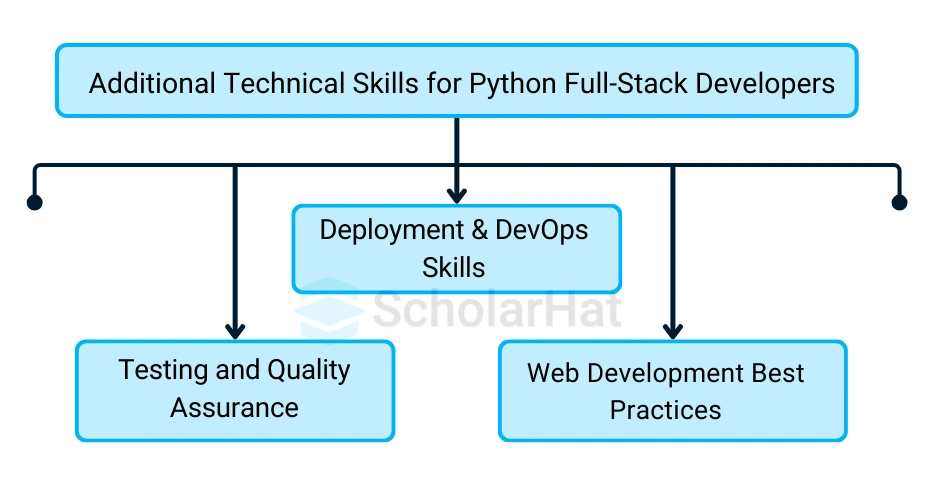
Full-stack engineers in Python should have multiple competencies to make good front-end and back-end conduct efficiently. Here are some extra abilities that can help you stand out:
- DevOps methods: Knowledge about the CI/CD pipeline and the use of containers, especially Docker or container orchestration platforms, especially Kubernetes, would assist in automating application deployment and scaling.
- Cloud Services: Cloud platforms, including AWS, Azure, and Google Cloud, might assist you in developing and deploying applications and managing extensions, storage media, and databases.
- Security Best Practices: Understanding basic security concepts like encryption, authentication, and authorization is important for protecting apps and users' information from threats.
- Testing and Debugging: It ensures that one’s code is reliable and any issues are identified and resolved promptly this is due to the understanding of testing frameworks like pytest and debugging tools.
5. Soft Skills Required for Python Full Stack Developers
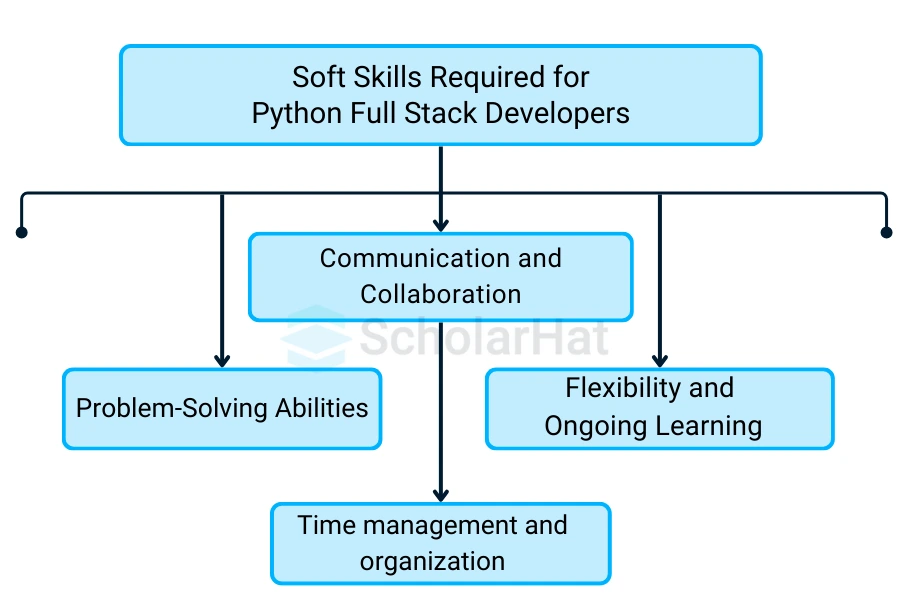
Soft skills, as well as technical competencies, also play a valuable role in the work of a Python full-stack developer. Here are some crucial soft skills for success in this role:
- Problem-Solving Skills: The fact that one is able to look at complex problems with logical and creative approaches assists in solving and finding the right solutions to problems.
- Communication Skills: Talking and listening are needed to work with the team, understand the requirements, and explain technical abstractions to others.
- Adaptability: One must be open to learning new technologies or processes, which enables one to cope with any changes a project may undergo.
- Time Management: When you have chosen the projects and learned how to organize your time, common deadlines throughout the whole stack are fulfilled, and other responsibilities are balanced.
These soft skills enhance the performance of the developers, eventually offering you the best results for the projects and cohesion among the teams.
How to Become a Python Full-Stack Developer 2025
- However, to become a Python Full-Stack Developer by 2025, you must learn Python and its backend frameworks, such as Django and Flask.
- Increase insights in front-end fields such as HTML, CSS, and JavaScript, as well as new tools such as React.
- Acquire hands-on experience with projects and internships and awareness regarding technologies and processes such as DevOps, cloud, and APIs.
- Develop your interpersonal and intercession capacities in enunciation and mannerism, sharpen your business pertinence, and keep learning at the same time.
Summary
We have learned that to become a Python Full-Stack Developer, you must first learn Python Full-Stack Developer skills such as Django and Flask on the backend and HTML, CSS, and JavaScript on the front end. Learn how to manage databases, implement APIs, and use version control. Develop soft skills such as problem-solving and communication while gaining practical experience through projects and internships. Also, consider our Python Programming For Beginners Free Course for a better understanding of Python concepts.


